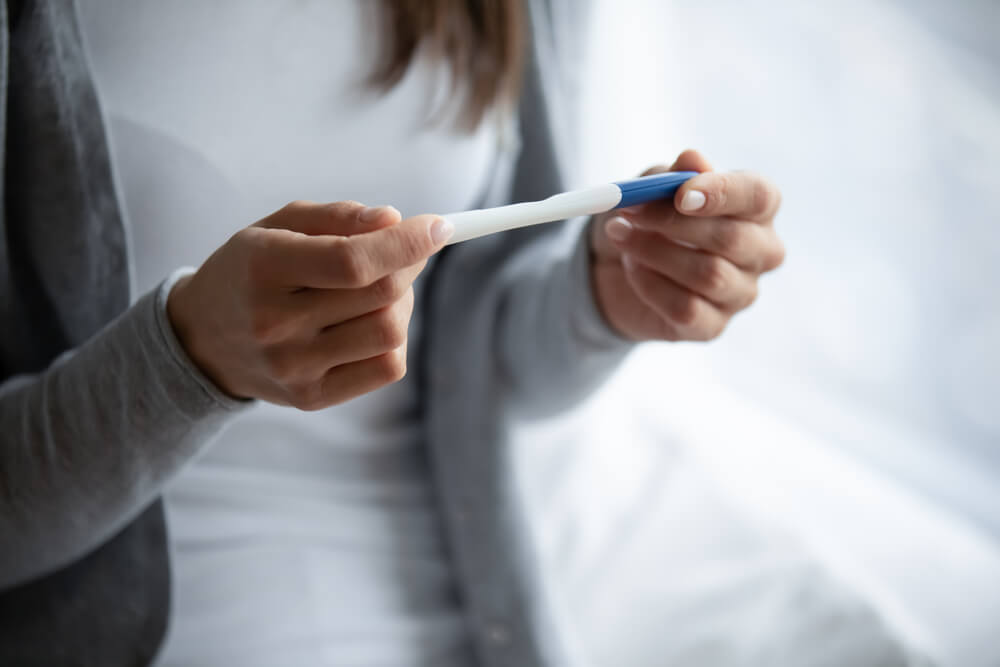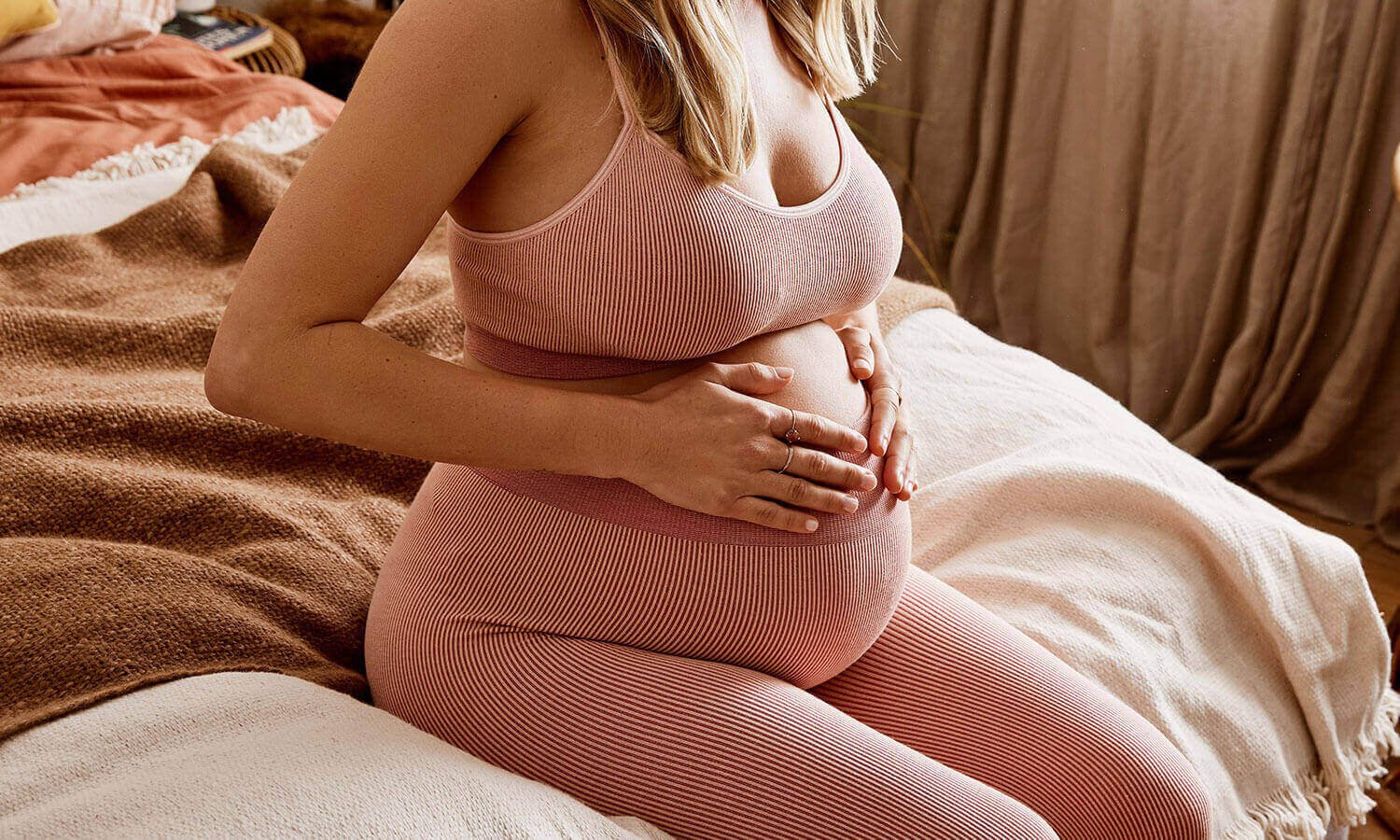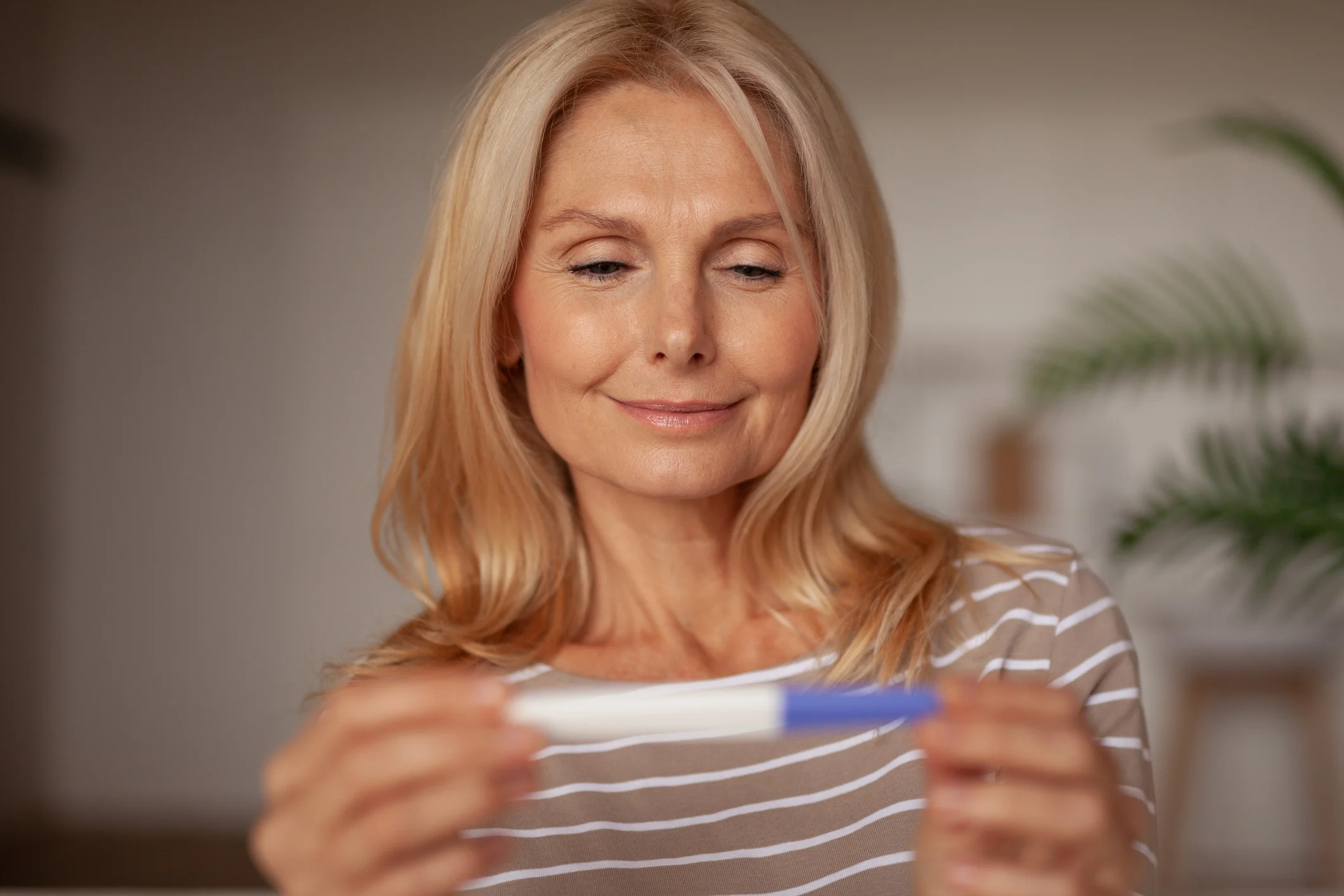Ever wondered about the likelihood of pregnancy after menopause? It’s a query that stirs curiosity, especially if you’re in your late forties, noticing signs of ovulation and dreaming about conceiving. The answer isn’t as clear-cut as you might think, and it’s bound to surprise you.
Menopause, the period marking the end of a woman’s menstrual cycles, is typically associated with a natural decline in reproductive function. But does this mean pregnancy is entirely off the cards? Not necessarily. Let’s find out about menopause and the possibilities that exist in between.

Contents
Can You Get Pregnant After Menopause?
Getting pregnant naturally after menopause is highly unlikely, but not entirely impossible in the very early stages of the transition. Menopause is marked by the end of a woman’s reproductive years, which is confirmed after a woman has gone 12 consecutive months without a menstrual period. Here are the key details regarding pregnancy and menopause:
Natural Pregnancy
-
During Perimenopause: Perimenopause is the transitional phase leading up to menopause. During this period, menstrual cycles can become irregular, but ovulation still occurs sporadically. It’s technically possible, though not very likely, to conceive naturally during this time because ovulation is unpredictable.
-
After Menopause: Once a woman is post-menopausal (having had no periods for 12 months), the ovaries no longer release eggs and natural conception is not possible. The production of key hormones like estrogen and progesterone drops significantly, which ceases menstrual cycles and ends natural fertility.
Assisted Reproductive Technologies
-
IVF and Donor Eggs: For women who wish to become pregnant after menopause, the use of assisted reproductive technologies (ART) like in vitro fertilization (IVF) is an option. This often involves the use of donor eggs from a younger woman, as the eggs of a postmenopausal woman are not viable for conception. The donor eggs can be fertilized with sperm in a lab and then implanted into the uterus of the postmenopausal woman.
-
Hormone Therapy: Women who opt for pregnancy later in life, particularly those who are post-menopausal, typically require hormone therapy to prepare the lining of the uterus for pregnancy. This therapy helps support a pregnancy achieved through IVF.
Factors Affecting Pregnancy After Menopause
Here are key factors affecting pregnancy after menopause:

1. Health and Age of the Woman
Overall Health: The general health of a postmenopausal woman is crucial, as pregnancy at an older age can pose significant health risks, including higher chances of hypertension, diabetes, and complications during labor.
Age: The older the woman, the higher the risk for both mother and child during pregnancy and delivery.
2. Quality of Donor Eggs
Egg Viability: Successful pregnancy heavily depends on the quality and viability of the donor eggs. Eggs from younger donors are typically healthier and have a higher success rate in fertility treatments.
3. Uterine Environment
Uterine Health: The health of the uterus is vital. Even with viable donor eggs, the woman’s uterus must be capable of supporting the implantation and growth of an embryo.
Hormonal Support: Postmenopausal women require supplemental hormonal therapy to prepare the endometrial lining for implantation and to support the early stages of pregnancy.
4. Technological and Medical Support
Quality of Fertility Clinic: The success rates of ART can vary significantly between clinics based on their technology, protocols, and experience.
Advancements in ART: Techniques in reproductive technology, including the freezing and thawing of embryos and genetic screening, also affect the likelihood of a successful pregnancy.
5. Psychological Readiness
Emotional Impact: Psychological preparedness to undergo fertility treatments and to handle potential outcomes—including failure of treatment—is crucial.
Support Systems: Emotional and practical support from partners, family, or friends can influence the decision and experience of pursuing pregnancy after menopause.
6. Financial Considerations
Cost of Treatment: ART treatments, particularly IVF with donor eggs, can be expensive and often require multiple cycles. The financial burden can be a significant factor in the decision-making process.
7. Ethical and Social Considerations
Personal Ethics: Ethical considerations, including concerns about parenting at an advanced age and the well-being of the child, play a role.
Social Perception: Societal attitudes towards older parenthood can impact the psychological and social well-being of both the parents and the child.
8. Legal Aspects
Legislation: Legal regulations surrounding ART and donor eggs vary by country and can affect access to and the specifics of treatment.
The Role of In Vitro Fertilization During Menopause
Here’s how IVF functions in the context of menopause:

Utilizing Donor Eggs
For postmenopausal women, the most common approach to IVF involves using donor eggs. These eggs are typically harvested from younger women, ensuring higher quality and viability. The donor eggs are fertilized in a laboratory setting using sperm from the patient’s partner or a sperm donor. The resulting embryos are then transferred to the uterus of the menopausal woman.
Use of Previously Frozen Eggs
Some women may opt to freeze their eggs earlier in life, anticipating future use. IVF can then be conducted using these preserved eggs, even after the woman has entered menopause. This allows the woman to use her genetic material for conception, despite the cessation of natural ovulation.
Hormonal Preparation
Because menopause results in significant hormonal changes that are not conducive to pregnancy, hormone replacement therapy (HRT) is necessary. HRT prepares the uterine lining to receive and nurture the embryo, mimicking the hormonal environment of a naturally fertile woman. This involves administering estrogen and progesterone to build up the endometrial lining, ensuring it is receptive to embryo implantation.
Embryo Transfer
After fertilization, the embryos are monitored for growth and development. One or more embryos are then selected and transferred into the uterus. This step requires careful timing to coincide with the optimal point in the artificially created menstrual cycle, maximizing the chances of successful implantation.
Success Rates
The success rates of IVF for menopausal women largely depend on the age of the egg donor. The younger the donor, the higher the chances of a successful pregnancy. However, factors like the health of the uterus and overall physical condition of the mother also play crucial roles.
Ethical and Psychological Considerations
IVF during or after menopause also brings ethical, psychological, and social considerations. Potential parents must consider the implications of late parenthood, including health risks to the mother and child, as well as the social and emotional aspects of raising a child at an advanced age.
Long-Term Health Monitoring
Women who conceive via IVF during menopause are at a higher risk for pregnancy-related complications such as gestational diabetes, hypertension, and preterm labor. Continuous medical monitoring throughout the pregnancy is essential to manage these risks effectively.
Potential Health Risks of Pregnancy After Menopause
Pregnancy after menopause doesn’t occur naturally. It’s an event that requires medical intervention, like In Vitro Fertilization (IVF) and carries substantial health risks with it. Let’s consider these risks, entirely backed by sound medical research.
- High Blood Pressure: Take the case of the Iranian woman mentioned earlier, who endured hypertension during her pregnancy. Studies indicate that postmenopausal women are at a greater risk of developing pregnancy-induced hypertension.
- Gestational Diabetes: Our Iranian case underwent hyperglycemia during gestation, another frequent issue in pregnancies after menopause. Elevated glucose levels, as high as 350 mg/dL observed in this case, can lead to serious complications such as premature birth.
- Preterm birth: The previously mentioned case reported a preterm birth, the baby girl being born at 34 weeks with a weight of 1780 g and height of 47 cm. Advanced maternal age increases the risk of premature delivery.
- Low Birth Weight: Citing the same case, the baby’s low weight at birth is another consequence often seen in postmenopausal pregnancies. The Iranian woman’s child weighed 1780g, showing a clear instance of underweight newborn issue.
- Neonatal Intensive Care: The baby from our case study was admitted to the Neonatal Intensive Care Unit (NICU). Babies born to aged mothers often require intensive care due to several health issues.
- Feeding Complications: The newborn in this case was fed through a Nasogastric (NG) tube, symbolizing feeding complications associated with babies born to postmenopausal mothers.
Frequently Asked Questions
Can a woman still ovulate after menopause?
No, ovulation ceases after menopause due to a decline in reproductive hormones. Although there may be some irregular cycles before reaching menopause, after menopause a woman’s ovulatory cycle no longer occurs.
What are the chances of a 50-year-old woman getting pregnant naturally?
The chances of a 50-year-old woman getting pregnant naturally are quite low. By this stage, only about 10% of women will be able to conceive in a year of regular, unprotected sex. After the age of 55, the chances drop significantly further.
Can a woman get pregnant after menopause if she has no period?
No, natural conception is not possible after menopause. When a woman is postmenopausal and has not had a period for 12 consecutive months, her hormone levels are no longer suitable to support pregnancy as she no longer ovulates or produces eggs for fertilization.
What are the three stages of menopause?
The three stages of menopause are perimenopause, menopause, and postmenopause. During these stages, the ovaries atrophy causing a decline in the production of hormones estrogen and progesterone, which stimulate the menstrual cycle.
Who is the oldest woman to naturally conceive?
The oldest woman to naturally conceive, as verified by the Guinness World Records, is Dawn Brooke. She conceived a son naturally at the age of 59 in 1997.
I am a medical student with experience and interest in Women’s health and well-being.